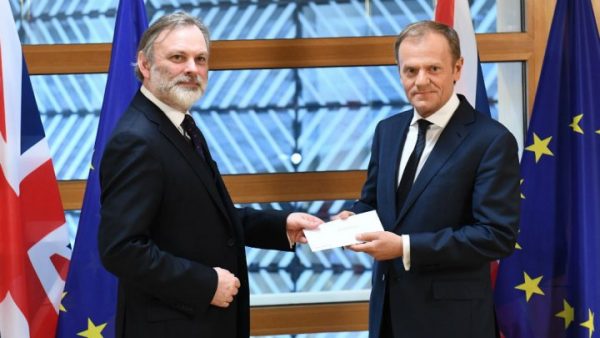
British Prime Minister Theresa May spoke to the House of Commons today to inform them that she has invoked Article 50 of the EU’s key treaty, which triggers a two-year countdown to the UK’s exit from the union.
A short time later her ambassador to the European Union, Tim Barrow, delivered the historic letter, signed yesterday by May, announcing Britiain’s intention to leave the EU.
BREXIT DEAL?
The 6-page letter set a positive tone for the talks though it admitted that the task of extracting the UK from the EU was momentous and that reaching comprehensive agreements within two years would be a challenge.
May wants to negotiate Britain’s divorce and the future trading relationship with the EU within the two-year period, though EU officials say that will be hard given the depth of the relationship.
“We believe it is necessary to agree the terms of our future partnership alongside those of our withdrawal from the EU,” May told Tusk in her letter, adding that London wanted an ambitious free trade agreement with the EU.
“If, however, we leave the European Union without an agreement the default position is that we would have to trade on World Trade Organization terms,” she said.
May has promised to seek the greatest possible access to European markets but said Britain was not seeking membership of the ‘single market’ of 500 million people as she understood there could be no “cherry picking” of a free trade area based on unfettered movement of goods, services, capital and people.
Britain will aim to establish its own free trade deals with countries beyond Europe, and impose limits on immigration from the continent, May has said.
In an attempt to start Brexit talks on a conciliatory note, May said she wanted a special partnership with the EU though she laced that ambition with an a clear linkage of the economic and security relationship.
EU leaders will welcome assurances of a constructive approach and appreciate a commitment to remain a close partner for the EU and to encourage its development, as well as an explicit recognition that Britain cannot retain the best bits of membership after leaving.
They may be less warm to an implication that Britain could live with a breakdown of talks on trade coupled with what might be seen as a threat to disrupt the security and counter-terrorism cooperation for which Britain, as a member of the U.S.-backed Anglophone Five Eyes system, is highly valued.
“We should work together to minimize disruption and give as much certainty as possible,” May said. “Weakening our cooperation for the prosperity and protection of our citizens would be a costly mistake.”
Tusk said the EU would seek to minimize the cost of Brexit to EU citizens and businesses and that Brussels wanted an orderly withdrawal for Britain.
“We already miss you,” Tusk said. “Thank you and goodbye.”
Within 48 hours, Tusk will send the 27 other states draft negotiating guidelines. He will outline his views in Malta, where he will be attending a congress of center-right leaders. Ambassadors of the 27 will then meet in Brussels to discuss Tusk’s draft.
“DAMN NARROW TIME-FRAME”
But the course of the Brexit talks – and even their scope – is uncertain.
“The time-frame is damn narrow,” said Martin Schaefer, a spokesman for the German Foreign Ministry.
A huge number of questions remain, including whether exporters will keep tariff-free access to the single market and whether British-based banks will still be able to serve continental clients, not to mention immigration and the future rights of EU citizens in the UK and Britons living in Europe.
One major uncertainty for May is who will be leading France and Germany, which both face elections this year.
“It’s bad news for everybody. It’s a wedge pushed into the European project,” said French centrist presidential candidate Emmanuel Macron, who has made clear he would ensure Britain gains no undue advantages outside the Union.
UNITED KINGDOM?
At home, a divided Britain faces strains that could lead to its break-up. In the Brexit referendum, England and Wales voted to leave the EU but Scotland and Northern Ireland voted to stay.
Scottish nationalists have demanded an independence referendum that May has refused. In Northern Ireland, rival parties are embroiled in a major political crisis and Sinn Fein nationalists are demanding a vote on leaving the UK and uniting with the Republic of Ireland.
May said she knew that triggering Brexit would be a day of celebration for some and disappointment for others.
“Now that the decision to leave has been made and the process is under way, it is time to come together,” she said.
France24/REUTERS

Leave a Reply
You must be logged in to post a comment.